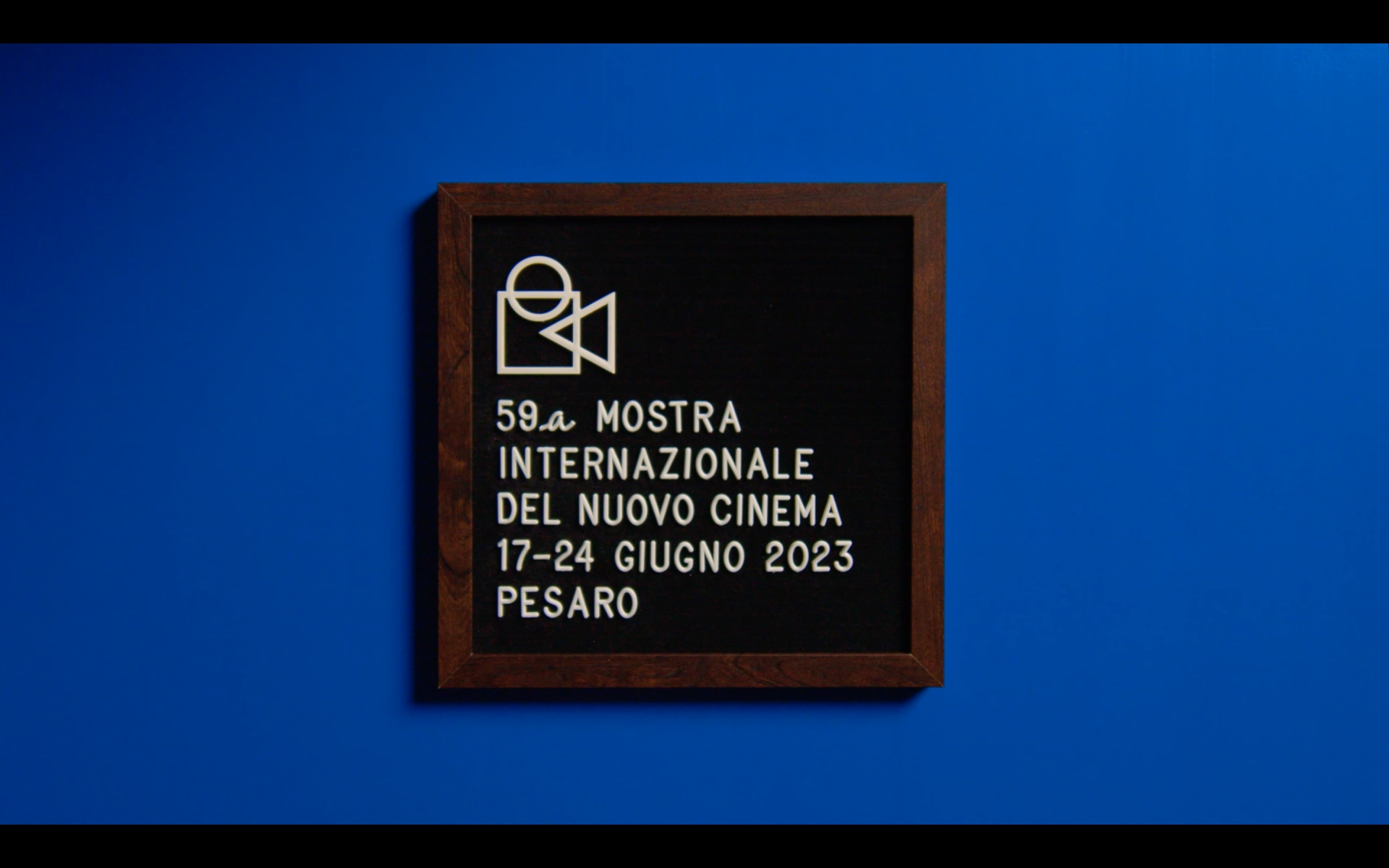59th edition's program preview
Oscar® winner Giuseppe Tornatore, Carlo Verdone, Dante Ferretti, three Italian films in world premiere, space for Argentine experimental cinema and that of two international female directors, German Milena Gierke and Anglo-Palestinian Rosalind Nashashibi
The Pesaro Nuovo Cinema Foundation is proud to unveil the main contents of the 59th edition of the Mostra Internazionale del Nuovo Cinema with just over a month to go.
The festival's International Competition directed by Pedro Armocida is an almost unique case as it is open to all formats and all filmmakers, with no barriers of age, duration, 'genre', fully devoted to the search for the 'new' cinema and in a position of advancing the new languages of audiovisual. Once again for this new edition, the competition will be judged by three juries, one composed of students only, another professional one with internationally prominent personalities, and finally the jury of the new Italian Critics' Award (SNCCI) composed of critics from the National Union of Italian Critics within the protocol signed with the Association of Italian Film Festivals (AFIC).
The already announced cult film and symbol of the 1980s Flashdance will open the 59th edition of the festival. Forty years after its debut in theaters, Adrian Lyne's film starring an unforgettable Jennifer Beals, which won an Oscar® for best song, Flashdance... What a Feeling by Giorgio Moroder and Keith Forsey, performed by Irene Cara, returns to the big screen in Italy thanks to the Mostra Internazionale del nuovo cinema.
After Liliana Cavani and Mario Martone, the special event on Italian cinema devotes its attention to the cinema of Oscar® winner Giuseppe Tornatore. All his films for cinema will be presented, including Ennio, an extraordinary document on Morricone, and Nuovo Cinema Paradiso in its restored version, in collaboration with Cinecittà SpA, on the occasion of his 35th birthday. A photography exhibition and the monograph Giuseppe Tornatore. Cinema and Films – edited by Pedro Armocida and Emiliano Morreale), 85th volume of Marsilio's Nuovocinema series – will also pay tribute to the artist, who will be a guest in Pesaro for a panel discussion.
On its way to Pesaro 2024 - Italian capital of culture, Pesaro Film Festival intends to pay tribute to the most popular Italian cinema by meeting great authors and presenting films that have made the history of cinema, not only the Italian one. The elected place for meeting with great characters and life stories is the Cinema in Piazza. In addition to the opening film, Flashdance, and closing film, Nuovo cinema paradiso, the Piazza will host a series of screenings accompanied by its protagonists such as Dante Ferretti, the great Oscar®-winning set designer, who will accompany the presentation of his autobiography Imagine First. My Two Births, Cinema, the Oscars (by Dante Ferretti with David Miliozzi, Jimenz Editions) on the occasion of his 80th birthday with a screening of Martin Scorsese's Hugo Cabret for which he won his third statuette. Carlo Verdone will tell the audience about his extraordinary career and present Borotalco, which turned 40 last year, in which for the first time he plays a well-rounded leading man.
There is also great anticipation for the Festival's world premieres. It starts with one of the greatest poets of the second half of the twentieth century and a protagonist of the Roman cultural scene, Dario Bellezza to whom the documentary Bellezza, addio by Carmen Giardina and Massimiliano Palmese is dedicated, the same directors of Il caso Braibanti, which right from the festival, in 2020, began a journey that led it to great public and critical acclaim. Of a completely different tenor is Cocoricò tapes the documentary signed by Francesco Tavella, which recounts with unpublished images and archival materials the long nights of the Romagna disco that became a place of artistic, political and social expression in the 1990s. Then there is a surprising directorial debut by Alessandro Marzullo, who also wrote the screenplay for Non credo in niente, a nocturnal journey into the souls of four young people in their late 30s who do not want to give up their passions with a cast of young performers such as Demetra Bellina, Giuseppe Cristiano, Renata Malinconico, Mario Russo, Lorenzo Lazzarini, Gabriel Montesi, Antonio Orlando and Jun Ichikawa. Also a world premiere of a short film, Sognando Venezia, which will be presented by its director Elisabetta Giannini and leads Francesco Di Leva, who was just awarded the David di Donatello for best supporting actor for Mario Martone's Nostalgia, and his daughter Morena Di Leva.
Music also returns as a protagonist of the 59th edition with the concert in the Square, Classical Music in Cinema, on World Music Day, June 21, by the students of the G. Conservatorio di Musica. Rossini, and with The Wall of Sound, an experimental project, dedicated to Zagor Camillas, which sees the meeting of cinema, notes, visions and music with four concerts featuring artists such as Obelisco Nero and Vittorio Ondedei, Pivio, Giacomo Laser, Salvatore Insana and Silvia Cignoli.
Peculiar to the International Film Festival is its look at the world through a wide range of proposals related to new cinema such as the unprecedented program of contemporary Argentine experimental cinema and the two focuses dedicated to as many female directors, German Milena Gierke and Palestinian-English Rosalind Nashashibi. While Federico Rossin's History Lessons focus on some Eastern European countries, such as Hungary, Romania, and Poland, where, at the height of the Cold War, dozens of filmmakers defied pro-Soviet authorities to make experimental films often in open political, aesthetic and economic rupture.
The Festival's openness to the cinema of Uzbekistan also fits in with this perspective, leading to a collaboration with its national festival, the Tashkent Film Festival, with a tribute to Uzbekistan's greatest filmmaker, Ali Chamraev, who will present in Pesaro his 1971 film, Without Fear, set in the 1920s but with a very timely theme related to the modernization of the country when women were allowed to remove their veils.
